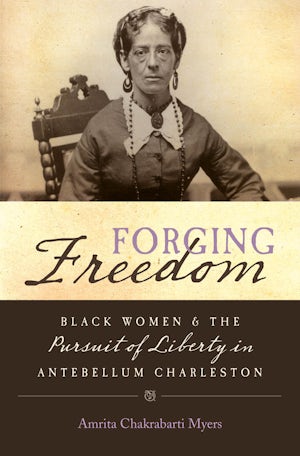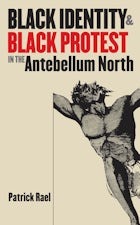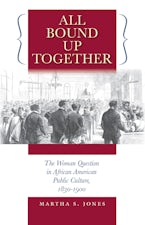Forging Freedom
Black Women and the Pursuit of Liberty in Antebellum Charleston
By Amrita Chakrabarti Myers
282 pp., 6.14 x 9.21, 3 halftones, 2 maps, 7 tables, notes, bibl., index
-
Paperback ISBN: 978-1-4696-1904-0
Published: August 2014 -
E-book PDF ISBN: 979-8-8908-8281-3
Published: November 2011 -
E-book EPUB ISBN: 978-0-8078-6909-3
Published: November 2011
Gender and American Culture
Buy this Book
- Paperback $37.50
- E-Book $19.99
For Professors:
Free E-Exam Copies
Awards & distinctions
2012 Julia Cherry Spruill Prize, Southern Association for Women Historians
2011 George C. Rogers Jr. Award, South Carolina Historical Society
2011 Anna Julia Cooper - CLR James Book Award, National Council for Black Studies
2012 Phillis Wheatley Book Prize, North East Black Studies Association
Drawing on legislative and judicial materials, probate data, tax lists, church records, family papers, and more, Myers creates detailed portraits of individual women while exploring how black female Charlestonians sought to create a fuller freedom by improving their financial, social, and legal standing. Examining both those who were officially manumitted and those who lived as free persons but lacked official documentation, Myers reveals that free black women filed lawsuits and petitions, acquired property (including slaves), entered into contracts, paid taxes, earned wages, attended schools, and formed familial alliances with wealthy and powerful men, black and white--all in an effort to solidify and expand their freedom. Never fully free, black women had to depend on their skills of negotiation in a society dedicated to upholding both slavery and patriarchy. Forging Freedom examines the many ways in which Charleston's black women crafted a freedom of their own design instead of accepting the limited existence imagined for them by white Southerners.
About the Author
Amrita Chakrabarti Myers is associate professor of history at Indiana University at Bloomington.
For more information about Amrita Chakrabarti Myers, visit
the
Author
Page.
Reviews
“An important contribution to the growing scholarly canon on the long-silenced voices of black women, both enslaved and free. Highly recommended. All levels/libraries.”—CHOICE
“Myers’ richly-documented Forging Freedom provides a vivid portrait of [freedwomen’s] lives.”—Civil War Book Review
"Carefully researched and lucidly written."—Journal of American History
“Myers’s compelling study makes a significant contribution to this literature, drawing much-needed attention to the significance of the urban environment in shaping ideas of freedom in the pre-Civil War South and to the particularity of women’s experiences.”—Journal of Southern History
“A carefully argued work that makes an invaluable contribution to the larger historiography of African American women. . . . Any academic, student, local or regional scholar interested in Urban America, Women’s History, Antebellum South, and African American history will find value in this study.”—Southern Historian
“What is so remarkable about this volume is Myer’s attention to detail in uncovering these forgotten women’s often astonishing stories and putting them in the context of the shifting laws and politics of the antebellum period. . . . This is definitely ground-breaking scholarship.”—Carolina Historical Magazine
Multimedia & Links
Amrita Chakrabarti Myers from CSAS on Vimeo.



